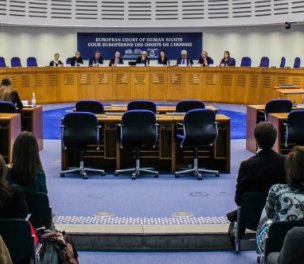Click to read the article in Turkish
The European Court of Human Rights (ECtHR) concluded two applications against Turkey yesterday (June 15).
Examining the application of Ömer Çağdaş Ersoy dated 2019, the ECtHR has concluded that his freedom of expression as per the Article 10 of the European Convention on Human Rights (ECHR) was violated.
In justifying the judgement, the ECtHR has referred to its previous rulings indicating that "when compared to normal individuals, the acceptable limits of criticism for politicians can be wider."
Accordingly, the Court has ruled that Turkey shall pay a total of 4 thousand Euro to Ömür Çağdaş Ersoy as damages and court expenses.
In 2012, when he was a student at the Middle East Technical University (METU) in Ankara, Ersoy stood trial on charge of "insulting a public official on duty" over his remarks about Recep Tayyip Erdoğan, the then Prime Minister and the current President of Turkey. When the trial was concluded, Ömer Çağdaş Ersoy was sentenced to a fine on the offense charged.
Referring to the Justice and Development Party (AKP) of Erdoğan, Ersoy said that "the AKP's method of governing the country was a dictatorship." The court referred to this statement as the reason for his conviction.
In the related speech, Ersoy also said, "Friends, today, the detention of our friends with a sham operation has ended in victory, but this is a temporary victory. This fight is the second smack to the slap received by Tayyip Erdoğan at METU, which he considered to be a stronghold to capture, and to his attacks on students as a dog mad with revenge."
'All ex officio insult investigations must drop'
Human rights lawyer Kerem Altıparmak has commented on this recent ECtHR ruling on his Twitter account.
"Following this ruling, if there are any ex officio investigations launched for insulting politicians without a criminal complaint, they must be dropped," Kerem Altıparmak has indicated, adding that "if there is a criminal complaint, a sentence must be given as per the Article 125/1 of the Turkish Penal Code (TCK), a rule which is valid for everyone."
Altıparmak has noted that the use of the related article (125/3-a) of the TCK, which offers more protection for public officials than citizens against insults, for politicians is against the spirit of the ECHR:
"If we give a concrete example, following this ruling, no ex officio investigation can be launched without a complaint on the grounds that the Interior Ministry was allegedly insulted. The sentence given at the end of the trial cannot be higher than the petty crime of insult."
Kerem Altıparmak has underlined that the ongoing court cases must be concluded in line with this ruling.
'Likes' are a common form of freedom of expression
The ECtHR has also concluded the application of Selma Melike, who applied to the ECtHR in 2019 after being dismissed from her job as a cleaning worker at the Seyhan District Directorate of National Education in Adana province. The ECtHR has concluded that Turkey violated the freedom of expression of Melike, who will now be paid 2 thousand Euro in damages.
The Facebook likes of Selma Melike for posts with political content was considered a disciplinary action and her labor contract was terminated.
The ECtHR has indicated that it was not Selma Melike, who created or posted the related content on Facebook, adding that her action was limited to clicking the 'Like' button. The Court has noted that the use of 'likes' on social networks for people's interest and approval for content is a common and popular form of exercising one's online freedom of expression. (KÖ/SD)





sa.jpg)
